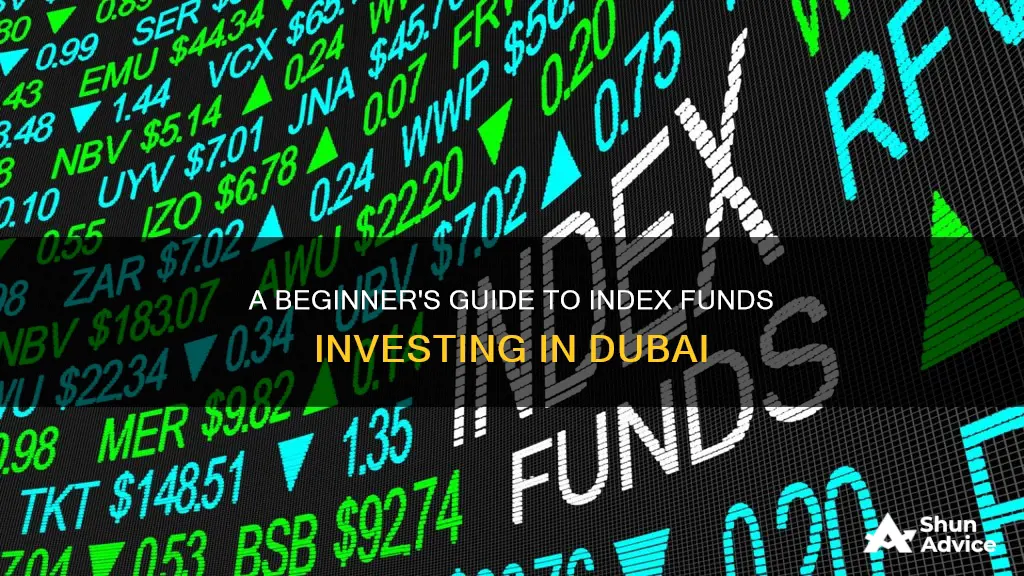
Index funds are a great way to invest in a diverse range of assets and markets, and they are available to investors in Dubai. They are a type of mutual fund or ETF (exchange-traded fund) that tracks a specific basket of investments, such as the FTSE Nasdaq Dubai UAE 20 Index or the DFM General Index. Index funds are passively managed, meaning they aim to match the returns of the index they track, and they are known for having lower fees and stable performance. This makes them a popular investment tool for building wealth.
What You'll Learn

Index funds are passively managed
Passively managed funds tend to charge lower fees to investors than actively managed funds. This is because they are not actively trading and do not require research analysts to choose stocks or timing trades. They also trade holdings less frequently, meaning lower transaction fees and commissions.
Index funds are a good option for those looking for a simple, low-cost way to invest in a range of assets and markets. They are also a good option for those looking to diversify their portfolio, as they invest in all the assets of an index, providing exposure to a wider range of companies, securities and regions.
Index funds are a popular investment tool for wealth building, as they offer lower risk, lower fees, and stable performance. They are also a good option for those with a longer-term investment plan or a higher risk tolerance.
When investing in index funds, it is important to consider the fees and performance of the fund before investing. It is also important to monitor your portfolio periodically to ensure it aligns with your financial goals.
Bond Funds: Best Time to Invest and Why
You may want to see also

They diversify your portfolio
Index funds are an excellent way to diversify your portfolio. By investing in an index fund, you are investing in all the companies that make up that index, resulting in a more diverse portfolio compared to buying individual stocks. Index funds are passively managed, meaning they aim to track the performance of a specific market index (e.g., S&P 500) and deliver the same return. For example, if the S&P 500 rises by 5% in a year, an index fund tracking it should also return around 5%. This passive management approach leads to more consistent performance than actively managed funds.
The diversification provided by index funds helps spread your risk across a broader range of assets. When you purchase shares of an index fund, you are exposed to all the stocks in that index. The idea is that the appreciating stocks will make up for the depreciating ones. Indexes like the S&P 500 or the Dow Jones Industrial Average are designed to track the overall stock market, while you can also invest in funds tracking specific sectors like oil, technology, or finance.
Index funds are also a cost-effective way to diversify. They have lower management fees than actively managed funds, making them a good value proposition for investors seeking diversification within a particular asset class or market. Additionally, index funds have lower expense ratios, and their passive management style keeps operating costs minimal.
Another benefit of index funds is their broad diversification. A single index fund can provide exposure to hundreds of companies across different sectors and regions. This level of diversification is challenging to achieve by investing in individual stocks.
It's important to note that while index funds offer immediate diversification, they are still subject to market risks. The diversification reduces the degree of risk but doesn't eliminate it entirely.
Index funds are a powerful tool for investors in Dubai and elsewhere, providing a simple, low-cost, and well-diversified option for those seeking to grow their wealth over the long term.
Equity-Linked Mutual Funds: A Guide to Investing
You may want to see also

They are a low-cost investment option
Index funds are a low-cost investment option. They are passively managed, which means that they are not actively managed by a fund manager. This passive management style means that the fund manager invests the pooled capital in the securities in the same proportion throughout the course of the investment. This is in contrast to actively managed funds, where the fund manager attempts to outperform the market. As a result, index funds have lower management fees and lower turnover in comparison to actively managed funds, making them more affordable.
Index funds are also a low-cost option because they are diversified. By investing in a range of assets and markets, index funds spread your risk. This means that you are not dependent on the performance of a single stock or market, reducing the potential for losses. This diversification also means that you don't need to build your portfolio one security at a time, which can be costly. Instead, you can invest in a broad range of companies, securities and regions through a single index fund.
Additionally, index funds have relatively low management fees compared to traditional open-end funds. This is because they are not actively managed and do not require the same level of analysis and decision-making as other types of funds. This makes them a cost-effective way to diversify your portfolio and gain exposure to a wide range of investments.
Another factor that contributes to the low cost of index funds is that they are bought and sold only for the price set at the end of the trading day. This simplifies the trading process and can help to reduce costs for investors. Overall, index funds are a low-cost investment option that offers investors a simple and affordable way to gain exposure to a diverse range of assets and markets.
Strategies for Investing Your Six-Month Emergency Fund Wisely
You may want to see also

They have lower management fees
Index funds are a type of mutual or exchange-traded fund (ETF) that tracks the performance of a market index, such as the S&P 500, by holding the same stocks or bonds or a representative sample of them. They are passively managed, meaning that they are not actively traded and aim to mirror the performance of a specific index. This passive management style results in lower management fees for several reasons.
Firstly, index funds have lower expenses and fees than actively managed funds. Actively managed funds have large staffs and conduct trades with more complications and volume, driving up costs. In contrast, index funds simply replicate the performance of a benchmark index, so they don't need research analysts and others to choose stocks or time trades. They also trade holdings less frequently, resulting in fewer transaction fees and commissions.
Secondly, index funds are typically bought and sold at the end of the trading day for the price set at the close of trading. On the other hand, ETFs can be traded throughout the day like stocks, providing more trading strategies and flexibility but potentially resulting in wider bid-ask spreads during volatility and trading commissions if brokerage charges for trades.
Additionally, index funds have lower turnover than actively managed funds, which contributes to their lower cost. Actively managed funds attempt to outperform the market, leading to more frequent buying and selling of securities, which can result in higher transaction costs and capital gains taxes.
Furthermore, index funds do not charge 12b-1 fees, which are advertising, marketing, and distribution costs that mutual funds pass on to their shareholders. Each investor in a mutual fund pays for the fund company to acquire new shareholders.
Finally, index funds are often purchased through specialised brokerage firms or mutual fund companies that deal in index funds. Some of these firms do not require a minimum investment or account minimum, making it easier for investors to get started with lower costs.
In summary, index funds have lower management fees due to reduced expenses, less frequent trading, the absence of certain fees like 12b-1 fees, and the availability of low-cost investment options. These factors make index funds a cost-effective way to diversify an investment portfolio and track the performance of a specific market index.
Tax-Exempt Funds: When to Invest for Maximum Benefits
You may want to see also

They are a safe investment option
Index funds are a safe investment option. Here's why:
Index funds are a type of mutual or exchange-traded fund (ETF) that tracks the performance of a market index, such as the S&P 500, by holding the same stocks or bonds or a representative sample of them. Index funds are passively managed, which means that they are not actively traded by a fund manager. Instead, they aim to replicate the performance of a specific market index. This passive management strategy means that index funds are considered lower risk than owning a few individual stocks. Because they are passively managed, index funds also tend to have lower fees and expense ratios than actively managed funds.
Index funds are also a great way to diversify your portfolio. By investing in an index fund, you are investing in all the companies that make up that index, resulting in a more diverse portfolio compared to buying individual stocks. This diversification reduces the degree of risk associated with your investments.
Index funds are a simple, low-cost way to invest in a range of assets and markets. They are ideal for beginners as they are a straightforward, cost-effective way to hold a broad range of stocks or bonds that mimic a specific benchmark index. They are also a good option for long-term investing, such as retirement accounts.
Despite the benefits of index funds, it is important to remember that they are subject to market swings and may perform poorly during prolonged downtrends in the market. Additionally, index funds lack the flexibility of active management, as they are designed to mirror a specific market and cannot pivot away when the market shifts.
Overall, index funds are a safe investment option due to their passive management, low fees, diversification benefits, and consistent performance.
A Smart Guide to Index Fund Investing
You may want to see also
Frequently asked questions
Index funds are a popular investment tool for wealth building. They offer broad diversification, lower risk, lower fees, and stable performance. They are passively managed, which means they require very little time for management and analysis. They also have lower management fees compared to actively managed funds.
You can purchase index funds via specialised brokerage firms or a mutual fund company. Some index funds require a minimum investment followed by a recurring investment. It is recommended that you start with an investment company that does not require an account minimum.
Some of the top index funds in Dubai include TD Direct International and Saxo Capital Markets.







